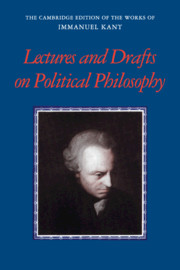Book contents
- Frontmatter
- Contents
- General Editors’ Preface
- Acknowledgments
- General Introduction
- Translators’ Remarks
- Reflections on the Philosophy of Right
- Natural Right Course Lecture Notes by Feyerabend
- Drafts for Published Works
- Drafts for Theory and Practice
- Drafts for Towards Perpetual Peace
- Drafts for the Metaphysics of Morals
- Drafts for Conflict of the Faculties
- Glossary
- Topical and Chronological Concordance
- Editorial Notes
- Index
Editor’s Introduction
Published online by Cambridge University Press: 10 December 2020
- Frontmatter
- Contents
- General Editors’ Preface
- Acknowledgments
- General Introduction
- Translators’ Remarks
- Reflections on the Philosophy of Right
- Natural Right Course Lecture Notes by Feyerabend
- Drafts for Published Works
- Drafts for Theory and Practice
- Drafts for Towards Perpetual Peace
- Drafts for the Metaphysics of Morals
- Drafts for Conflict of the Faculties
- Glossary
- Topical and Chronological Concordance
- Editorial Notes
- Index
Summary
Around 8:00 a.m. on Thursday April 29, 1784, Kant stood in a lecture hall in a house near the Albertina University in Konigsberg for the first session of his course on Natural Right. Since the renovations in his recently purchased house were not yet complete, and professors held their lectures in private rooms in their dwellings, he probably held the lecture in a room in the house near the Ochsenmarkt where he had lived for the previous six years. He had just completed his hour-long lecture for his Logic course, which had started the previous Monday and had met for the third time with a group of one hundred students. The day before, Kant had begun his Physical Geography course for sixtythree students at 8:00 a.m.; from this day until Saturday, September 25, he would teach every day but Sundays and university holidays. He was scheduled to lecture Mondays, Tuesdays, Thursdays, and Fridays on Logic and Natural Right for one hour each and Wednesdays and Saturdays on Physical Geography for two hours. Before beginning this third course of the summer semester, Kant referred to the few notes he had written in his own copy of the course textbook, Gottfried Achenwall's Jus Naturae, and perhaps others on loose scraps of paper. He began to lecture to the twenty-three registered students in the course, “The whole of nature is subject to the will of a human being as far as his power can reach excepting other human beings and rational beings.”
Among those twenty-three students who wrote those words down was Gottfried Feyerabend. He had matriculated at the university almost one year beforehand. Feyerabend was determined that day to write down as much as possible of what his professor was saying and continued to record Kant's lectures throughout the semester. If he worked like other student note-takers, he wrote quickly using many abbreviations and later worked through those notes to create a polished, full transcript. When the semester ended Feyerabend hired a copyist to produce clean copies of his transcript to be bound and sold to other students. Some copying must have been done months afterward since in the manuscript at hand the copyist mistakenly identified the semester as Winter Semester 1784. Nothing else is known about Feyerabend or his original notes.
Information
- Type
- Chapter
- Information
- Kant: Lectures and Drafts on Political Philosophy , pp. 75 - 80Publisher: Cambridge University PressPrint publication year: 2016
Accessibility standard: Unknown
- 1
- Cited by
